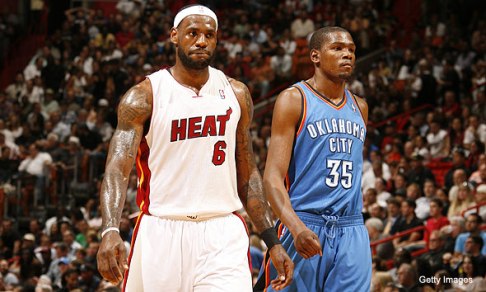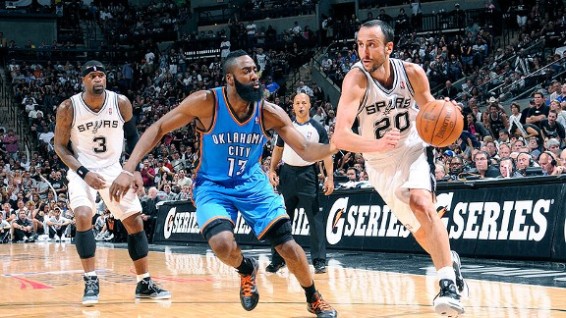The NBA Finals, which begin tonight, have been billed as a study in contrasts. The Miami Heat’s best player, LeBron James, will be confronted by his opposite number in the Oklahoma City Thunder’s Kevin Durant
James, it is said, is narcassitic off the court and unsure on it. Despite his immense talent his teams fail when the stakes are the highest–having won two games and lost eight in the NBA Finals and twice failed to reach the finals despite possessing the leagues best record. Worse, James refused the burden of leadership, fleeing responsibility in Cleveland to pal around with his buddies Dwyane Wade and Chris Bosh in South Beach. This lack of intestinal fortitude is why James has come up short in the biggest moments, as in his near no-show in last year’s Finals against the Dallas Mavericks seemingly confirms.
Durant on the other hand is humble off the court and ruthlessly efficient on it. He as worked hard to push his team inexorably closer to the ultimate goal, losing to the Lakers two years ago in the first round of the playoffs and the Mavericks last year in the Western conference finals before dispatching both former champions–along with four time champs the San Antonio Spurs–to advance to the NBA finals.
Durant’s game is more aesthetically pleasing than James’ (Durant is a Porche, James a Hummer) but most of these differences are completely overblown and derive from James’ ridiculous “Decision” television special followed by Durant quietly resigning with OKC days later. The seemingly clean cut, small town Durant can be just as image conscious as James, as is evidenced by the strategic way he has chosen to tattoo his body. It’s easy to disparage James for abandoning his home-state team and praise Durant for his loyalty, but first compare Cleveland’s roster with OKC. If you wanted to win a title would you leave Russell Westbrook, James Harden, Serge Ibaka? If you wanted to win, wouldn’t you accept less money to play with Wade and Bosh instead of remaining on a team where your best teammates are Mo Williams and Antawn Jamison?
Commentators would rather talk about LeBron’s supposed lack of ‘clutch-ness’ (whatever that is) than talk about the real reason he didn’t play well in the NBA finals last year: fatigue. I guess when you are 6’9″ and 270 lbs and play all five positions on defense and four of the five on offense you are not supposed to get tired. I think OKC will win in 6, but it will have nothing to do with LeBron’s headbands or Durant’s humility. It won’t mean the Durant is a better player than James, simply that his team is more balanced. LeBron has had to do EVERYTHING for his team to win in these playoffs, and in this series he will have to do it against the best scoring team in the league (incredibly, OKC’s points per game has gone UP in the playoffs!). Durant just has to be what he is–the leagues best scoring forward and arguably the NBA’s most indefensible player. LeBron’s greatness allows us to think that he can solve any problem on the court. Unfortunately for him, he can’t be all things to all people.


